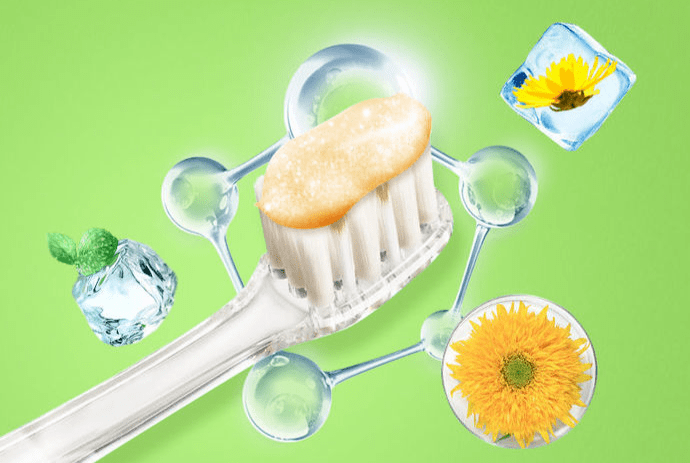Herbal Extract Used For Functional Toothpaste Applications
The human oral cavity is an ideal habitat for the growth of cariogenic bacteria and fungi. These microorganisms cause inflammation, infection, and disease of the gum tissues, teeth and other parts of the oral system. The need for effective and safe oral hygiene methods has led to the development of natural antimicrobial products. Plants are endowed with natural phenolic compounds, which act as antioxidants, astringent and have antimicrobial properties.
Herbal extracts are widely used in the production of toothpaste to prevent and control dental diseases and infections. They are able to provide many beneficial properties, including the ability to prevent and reduce plaque formation, inhibit the growth of bacteria and fungi, and improve overall oral health. Therefore, they are an excellent source of natural antimicrobials for use in the production of antimicrobial toothpaste. Compared with synthetic chemical, herbal extracts are more effective in preventing and controlling cariogenic bacteria, fungi, and other pathogens of the oral cavity. These herbal ingredients have the advantage of being safe for both adults and children. Today, we will introduce the herbal ingredients when choosing the right toothpaste and what is the safest ingredient.
Herbal Extracts for Functional Toothpaste
There are several herbal extracts that can be used in functional toothpaste formulations. Here are some commonly used herbal extracts in toothpaste:
Neem (Azadirachta indica): Neem leaf has powerful antifungal and antibacterial properties to keep your teeth clean. These time-tested herbal ingredients help fight gum problems like bleeding gums and brittle teeth. Neem extract has antimicrobial properties and helps fight against bacteria that cause plaque and gum disease.
Echinacea (Echinacea purpurea): Echinacea extract is packed with natural compounds that help reduce inflammation and provide antioxidant protection. It can help to kill bacteria that cause plaque and tooth decay. It also has immune-boosting properties and can help support oral health by reducing inflammation and fighting against oral bacteria and also, they can also help reduce gum inflammation and sensitivity.
Bloodroot extract(Macleaya Cordata): The extract of the bloodroot plant is mainly sanguinarine and chelidonine chloride. Sanguinarine is a cationic antibacterial agent derived from sanguinarine. Sanguinarine is a benzodiazepine alkaloid with a wide range of antibacterial activities (including aerobic and anaerobic bacteria, pathogenic and non-pathogenic oral bacteria). Clinical studies have shown that sanguinarine has bacteriostatic and bactericidal effects on most of the bacteria in oral bacteria, and interferes with the adhesion of bacteria to the newly formed dental membrane.
Aloe Vera: Aloe vera extract has soothing and healing properties for gums and can help reduce inflammation and gingivitis.
Peppermint (Mentha piperita): Peppermint extract provides a refreshing flavor and also has antimicrobial properties that can help freshen breath and fight against bacteria. These properties protect from germs and keep gums healthy.
Tea Tree (Melaleuca alternifolia): Tea tree extract is known for its antibacterial and antifungal properties, which can help fight against oral bacteria and reduce plaque formation. Many studies (randomized control trials and clinical trials) have shown that the use of tea tree extract results in a reduction of plaque and gingival scores reduce breath odor and increases salivary pH. Tea polyphenol extract has a unique refreshing fragrance and a good odor-removal effect. It can inhibit the biological activity and anti-adhesion of Streptococcus mutans and bacteria. It was found that tea polyphenols can effectively improve the levels of adiponectin and endotoxin in gingival crevicular fluid of patients with periodontitis, which is beneficial to the prevention and treatment of periodontitis.
Chamomile (Matricaria chamomilla): Chamomile extract has anti-inflammatory properties and can help soothe sensitive gums and reduce irritation. It is also good for sensitive teeth and helps prevent recurrent dental problems such as cavities, toothaches and brittle teeth.
Sage (Salvia officinalis): Sage extract has antimicrobial properties and can help fight against oral bacteria. It is also known to have a natural whitening effect on teeth. This herb has been shown can help reduce plaque in the mouth.
There are other plant-based ingredients that can be used for toothpaste applications, for example, papaya extract, pineapple extract, and almond peel which are natural whitening agents that whiten your teeth in two weeks. These herbal extracts can be used individually or in combination to create functional toothpaste that offers various oral health benefits. It’s important to note that the effectiveness and safety of these herbal extracts may vary, so it’s advisable to consult with a dental professional or seek products from reputable manufacturers when choosing toothpaste.



